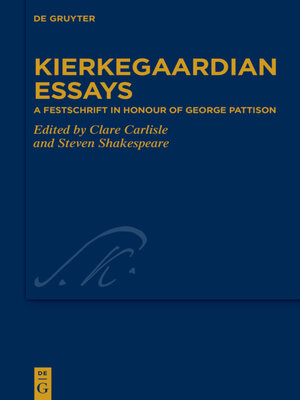Kierkegaardian Essays
ebook ∣ A Festschrift in Honour of George Pattison · Kierkegaard Studies. Monograph Series
By Clare Carlisle

Sign up to save your library
With an OverDrive account, you can save your favorite libraries for at-a-glance information about availability. Find out more about OverDrive accounts.
Find this title in Libby, the library reading app by OverDrive.



Search for a digital library with this title
Title found at these libraries:
| Library Name | Distance |
|---|---|
| Loading... |
Søren Kierkegaard argued that the most essential truths come to light by asking "How...?" This innovative collection of essays by leading scholars focuses on this questioning "How?", asking how we should relate to ourselves, to others, and to God; how we should be in the world; how we can become human. The result is a searching, original colloquium on what it means to be Kierkegaardian in the 21st century.
The adjective "Kierkegaardian" names many possibilities: ways of philosophizing, choosing, loving, looking, listening, reading, writing, teaching, making art, praying, going to church – or not going to church. "How" gestures to subjectivity, one of Kierkegaard's most fundamental philosophical categories, while "What" signals an objectifying line of thought. The authors of these essays suggest that the crucial Kierkegaardian question is not what we are and ought to do, but how we can remain true to the finitude, passivity, and ambiguity of human existence.
While this Kierkegaardian "how" is often acknowledged by scholars, it is rarely thematized directly. Attending to it elicits new kinds of argument and reflection. Kierkegaardian Essays proposes a fresh approach to Kierkegaard, and is essential reading for experts and students alike.
The adjective "Kierkegaardian" names many possibilities: ways of philosophizing, choosing, loving, looking, listening, reading, writing, teaching, making art, praying, going to church – or not going to church. "How" gestures to subjectivity, one of Kierkegaard's most fundamental philosophical categories, while "What" signals an objectifying line of thought. The authors of these essays suggest that the crucial Kierkegaardian question is not what we are and ought to do, but how we can remain true to the finitude, passivity, and ambiguity of human existence.
While this Kierkegaardian "how" is often acknowledged by scholars, it is rarely thematized directly. Attending to it elicits new kinds of argument and reflection. Kierkegaardian Essays proposes a fresh approach to Kierkegaard, and is essential reading for experts and students alike.






